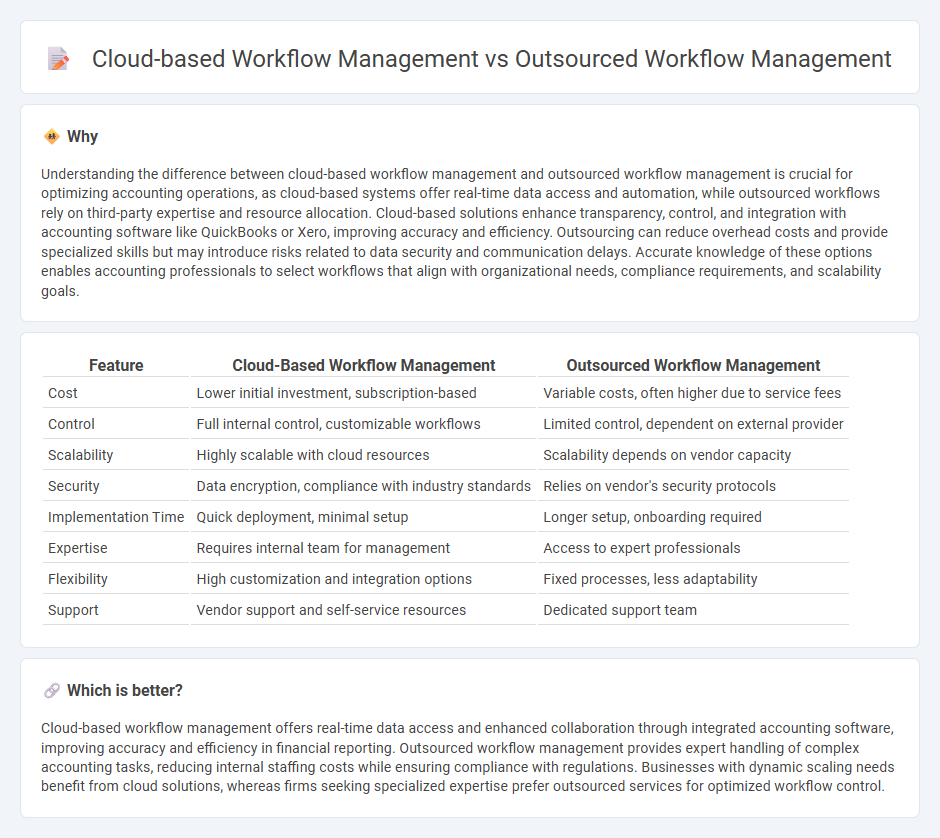
Cloud-based workflow management in accounting streamlines processes by leveraging real-time data accessibility, automation, and seamless integration with financial software, enhancing accuracy and efficiency. Outsourced workflow management offers expert handling of accounting tasks by specialized professionals, reducing internal workload and ensuring compliance with regulatory standards. Explore the benefits and limitations of each approach to determine the best fit for your accounting needs.
Why it is important
Understanding the difference between cloud-based workflow management and outsourced workflow management is crucial for optimizing accounting operations, as cloud-based systems offer real-time data access and automation, while outsourced workflows rely on third-party expertise and resource allocation. Cloud-based solutions enhance transparency, control, and integration with accounting software like QuickBooks or Xero, improving accuracy and efficiency. Outsourcing can reduce overhead costs and provide specialized skills but may introduce risks related to data security and communication delays. Accurate knowledge of these options enables accounting professionals to select workflows that align with organizational needs, compliance requirements, and scalability goals.
Comparison Table
| Feature | Cloud-Based Workflow Management | Outsourced Workflow Management |
|---|---|---|
| Cost | Lower initial investment, subscription-based | Variable costs, often higher due to service fees |
| Control | Full internal control, customizable workflows | Limited control, dependent on external provider |
| Scalability | Highly scalable with cloud resources | Scalability depends on vendor capacity |
| Security | Data encryption, compliance with industry standards | Relies on vendor's security protocols |
| Implementation Time | Quick deployment, minimal setup | Longer setup, onboarding required |
| Expertise | Requires internal team for management | Access to expert professionals |
| Flexibility | High customization and integration options | Fixed processes, less adaptability |
| Support | Vendor support and self-service resources | Dedicated support team |
Which is better?
Cloud-based workflow management offers real-time data access and enhanced collaboration through integrated accounting software, improving accuracy and efficiency in financial reporting. Outsourced workflow management provides expert handling of complex accounting tasks, reducing internal staffing costs while ensuring compliance with regulations. Businesses with dynamic scaling needs benefit from cloud solutions, whereas firms seeking specialized expertise prefer outsourced services for optimized workflow control.
Connection
Cloud-based workflow management enhances outsourced workflow management by providing real-time access, collaboration, and centralized data storage, which increases efficiency and transparency in accounting processes. Outsourced accounting firms leverage cloud platforms to streamline tasks such as invoicing, payroll, and financial reporting, ensuring accurate and timely delivery. This integration reduces operational costs and minimizes errors while enabling scalable and flexible accounting solutions.
Key Terms
Service Level Agreement (SLA)
Outsourced workflow management relies heavily on Service Level Agreements (SLAs) to define performance metrics, uptime guarantees, and response times, ensuring accountability between client and provider. Cloud-based workflow management often incorporates automated SLA enforcement through real-time monitoring and scalable infrastructure, offering higher flexibility and quicker issue resolution. Explore detailed comparisons of SLA structures and enforcement mechanisms to optimize your workflow management strategy.
Data Security
Outsourced workflow management involves delegating data processing tasks to external providers, which may introduce risks related to third-party access and compliance with data protection regulations such as GDPR and HIPAA. Cloud-based workflow management platforms offer built-in encryption, multi-factor authentication, and automated compliance monitoring to enhance data security and minimize vulnerabilities. Discover how these solutions compare in safeguarding your critical business information and ensuring regulatory adherence.
Cost Structure
Outsourced workflow management typically involves fixed monthly fees or per-project charges, with costs influenced by vendor expertise and service scope, potentially leading to higher upfront expenses and less flexibility. Cloud-based workflow management offers scalable, usage-based pricing models, reducing capital expenditure and allowing businesses to pay only for resources consumed, which optimizes operational costs. Explore detailed cost comparisons and case studies to determine the best approach for your business needs.
 dowidth.com
dowidth.com